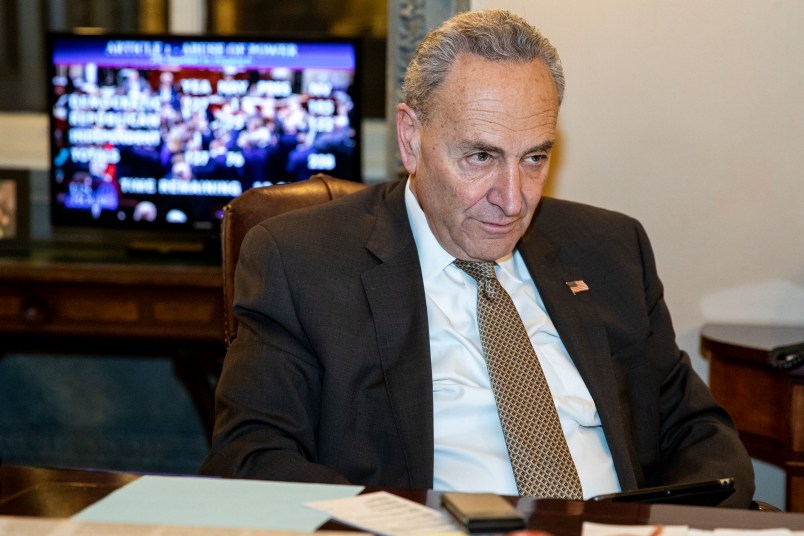Senate Minority Leader Chuck Schumer (D-NY) on Thursday left the door open to waiting for courts to enforce subpoenas of witnesses for a Senate impeachment trial if need be.
His comments to reporters a day after the House took its historic vote to impeach President Donald Trump came as he is publicly feuding with Senate Majority Leader Mitch McConnnell (R-KY) over whether the Senate should to agree to call witnesses in the first place.
Schumer was asked by TPM whether, if he did reach an agreement on witnesses, he’d be willing to wait for a court fight if those witnesses refused to testify.
“We’ll have to see how that’s pursued,” Schumer said. “We have to look, legally, how quickly it could happen and everything else. We don’t want to delay this unnecessarily, but at the same time we don’t want to, on something as solemn and serious as this, if there is serious testimony, we ought to make every effort to get it.”
The House chose not to wait for courts to enforce their impeachment inquiry subpoenas, once the administration announced it was stonewalling them. Republicans have jumped on that decision to argue the House rushed through the process.
Now, Schumer is requesting that the Senate call four top Trump administration officials to testify for its trial. He wants an agreement with McConnell on witness and document subpoenas before the trial starts. McConnell, meanwhile, has argued that the decision on witnesses should wait until after the Senate has proceeded through the first few stages of the trial, as was done in the 1999 impeachment of President Bill Clinton. More broadly, McConnell is pushing for a short trial — but if Democrats can get four Senate Republicans to agree with their demand for witnesses, they will be able to overrule that preference.
“I will ask for votes for each of these witnesses and these documents,” Schumer said Thursday, noting the Senate impeachment rules that would allow such a vote to be called. “Our colleagues should know they are going to be asked to vote on these things.”
Among the witnesses Schumer is requesting is former National Security Adviser John Bolton, who has signaled through his lawyer his willingness to testify for the impeachment proceedings — but only if Congress gets a court order backing its request for testimony over the President’s directive for non-cooperation.
“We”ll have to wait and see. Maybe Bolton will change his mind,” Schumer said, while bringing up a claim by Bolton’s lawyer that he has information to share with Congress that’s not publicly known. “It’s very important to have him come testify.”







Hmmmmm…is it just me or does it sound like Nancy and Chuck have cooked something up together?
Oh, dear! Schumer is considering the possibility of contemplating convening a committee that will take under advisement the idea of exploring the pros/cons of using the courts with regard to witnesses. Such bold, decisive actions are the hallmark of our Dem leadership.
When the GOP kicks sand in your face, just take it and say, “Thank you, sir, may I have another?”
No witnesses, no phoney “acquittal” (it’s just political nullification after all). I like this plan.

Schumer should camp out at CNN and MSNBC and appear on every available show to say:
Rinse. Repeat.
I don’t believe the rules of impeachment prohibit the House from holding additional hearings next summer. Might even gather enough testimony to craft additional articles of impeachment.
Beautiful. Schumer and Pelosi singing in harmony.
If Republicans want to claim the House rushed Impeachment, surely they’ll want to wait for the court cases to be resolved to bring in first-hand witnesses. No? Oh, that’s right. McConnell wants to sweep it all under the rug. He really has a bad hand to play here and Dems know it.